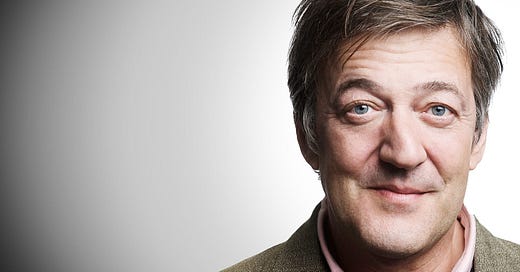This channel has been dormant for too long. I began with great hopes, seeing before me a wide open, empty but fertile land which I would sow with content of whatever kind I chose; but particularly, I thought half-secretly, with those things I wanted to talk about but had no obvious commercial application (i.e. rejected pitches). And so it was. But, as so often in my life, the willpower waned and it became a disposable part of my routine, as there was no pecuniary return and it was not easy to gauge how many people read and enjoyed it.
For almost as long, I have been chiding myself and intending to restart it. So here we are. And for some years, too, I have had the idea which I will explore rattling semi-formed around in my head.
Last year I wrote a piece for LinkedIn which tried to explain why I became a writer, and the journey which I’d been on to arrive at the place at which I felt justified in saying I was a writer, without apology or qualification. People were kind enough to say they enjoyed it, and some said they had even felt inspired or perhaps understood by it. “You’re absolutely right,” said one friend, himself a fine wordsmith, “you can’t tell a writer anything.”
At the back of my mind as I wrote that piece, however, was the lurking presence of one writer above all, the man of letters who really fired my imagination and continues to do so, and to whom I owe a huge intellectual legacy. That man, I have no hesitation in revealing, is Stephen Fry.
There are no simple ways to explain how deeply I am in Fry’s debt. I carry his voice with me in my head always, I cherry-pick his best aphorisms and turns of phrases (generally, when I can, with attribution: I try not to pass them off as my own), and it is his style and approach into which I instinctively fall when I want to express myself well.
I can point to two distinct pieces of work which threw Fry’s spell over me. The first was the insanely inventive and ecstatically funny A Bit of Fry and Laurie, the comedy sketch show he and Hugh Laurie wrote and performed in the late 1980s and early 1990s. It began when I was only 11, and was certainly not aimed at me or my age mates, but as a precocious child who desperately wanted to be grown-up and sophisticated (ambitions which have not left me) I tuned in and was spellbound.
At that age I could not have articulated why it appealed to me so much. Looking back, however, I think I can see some of the elements which drew me in: both Fry and Laurie were obviously clever, well-to-do young gentlemen, and Fry in particular had strong “tweedy” vibes (a word that has haunted him but which I thought was hugely aspirational). They had a strong sense of the absurd, which I liked, and they parodied forms which I recognised, suggesting that they had some of the same passions as I did.
There was also a degree of self-selection. I liked liking Fry and Laurie because few of my age-mates did; they might watch Blackadder, but this odd, wordy sketch show was beyond their tastes, simply not de rigeur for 11-year-olds. I had even then realised if I was by inclination to be the odd man out then I might as well lean into it.
The legacy of Fry and Laurie for me is deep. I feel an instant kinship with other devotees, can swap lines with some of my best friends and am still brought to helpless laughter by sketches like Haircut and Language. (I had a post removed from Instagram yesterday because I paraphrased the line of Stephen’s hairdresser character about “slitting his tiny throatlet for being so old”: the automatic censor discerned a threat of violence in it.)
More powerful still was Fry’s first novel, The Liar. For me the memory is quite clear: we (my stepfather, my mother and I) listened to the audiobook of it, Fry narrating, of course, as we drove to Oxford for me to start my first term there in Michaelmas 1994. Consulting Google I see that it lasts eight hours, which must have been longer than the car journey (though not by much), but I may have listened to the end afterwards. In any event, listening to Fry read his dizzying comic novel had an effect that was nothing short of electrifying. To say that I loved it would be an understatement. I adored it, I was captivated by it, I wanted to cram it into my brain through my ears and play with it to see what it would reveal.
Although it is nearly 30 years ago, I can say quite confidently why I fell in love with it too. It was Fry’s use of language. I had simply never heard, nor read, anyone who played with words in that way. It seemed to an impressionable 16-year-old with a love of reading that he was a supreme kind of puppet-master, one with a feather-light touch, who could make words swoop and soar and dive, who could go from high-falutin’ and grandiose to base swearing in the blink of an eye, and make a virtue of the incongruity.
There are some pleasing touches in the book. The descriptors of people by their clothing—particularly the two suited gentlemen, the Tommy Nutter and the Bennett, Tovey and Steele: I had no idea of these Savile Row references at the time—the prim hilarity of Donald Trefusis and the heartfelt passion of the protagonist Adrian were delicious, as was the Cambridge setting of much of the novel, though I was Oxford-bound.
The description of Adrian’s passion for his schoolfriend Hugo I found particularly affecting. Although Fry was writing about a homosexual relationship, I intuitively understood the solipsistic and furious depth of feeling he was relating, the teenage peculiarity of Adrian’s love. Girls had not featured largely in my life by that stage, as I had attended all-male schools, but the odd passing crush had flitted through my young mind, and it set me up for many intense, often unrequited fixations over the next years. Adrian’s self-analysis, his self-indulgent but critical reflections on his own life and state of mind, appealed to my interiority and my shyness, the wariness with which I hoarded my feelings.
Fry seemed to me the homme idéal. He was unsporty and ungainly (at last! a hero in my own mould), tall and awkward but fearsomely bright and cultured. He had already developed then a reputation for knowing everything, and that partly depressed me—how could one aspire to such mastery of the world and all its lore?—but also drove me on. It told my hungry and absorbent brain that this was the model for which I should strive, accumulating every scrap of knowledge, trying to file it away and then deploying it with studied ease at an appropriate moment.
I remain a fiercely devoted adherent. Fry and I do not have the same politics, nor all the same tastes, but that love of language, that heady adoration of the arrangement of words and displays of verbal felicity, beats in my heart as powerfully as ever. I am always, always hunting for nuggets of information, stories, anecdotes, tiny facts that might enliven a conversation or a piece of writing. I can worry at words and concepts, deconstruct them and look inside for greater meaning or understanding, and I think, if this is not too immodest, it is a trait I share with the great man.
For me the word, written or spoken, is of supreme importance. The English language is a gift of extraordinary richness and versatility, and I adore it. It is my gymnasium and my playground, as well as an eternal schoolroom. When I find a word which I don’t know, I want to know everything about it: what it means, how it is used, where it comes from, how it came to our language from its root.
Words, phrases, sentences are my bag. They are my thing. They are what excite me. I hope I’m not excessively self-regarding but I can derive huge pleasure from crafting a neat phrase, putting together words in a way which carries meaning along with elegance and wit. I know I have (many) faults: I am too flippant, too wordy and I am too tempted by a neat phrase over a watertight argument. But these are, I think and hope, products of excessive enthusiasm for the linguistic arena. I have said before that I am hugely indebted to all of those who have edited my work: they rein in some of my worst excesses, knock out the smuggest and most precious elements and generally render my occasionally rococo and tortured prose into something much more digestible. I am not a good editor of my own work, but there are times when I do like the copy I produce.
Fry is now a national treasure. Indeed, he almost exemplifies the concept. He has, it is said, a “planet-sized brain”, and the evidence seems very strong; he knows, too, a great deal about a great deal and I do not compare myself with him on anything like an equal footing. But his words still make me dizzy. He is, in some regards, what I aspire to be, the writer I would love to become, or at least to play in the same league. Although he complains bitterly that he cannot sing, his voice is instantly recognisable, a soothing, smooth baritone that bespeaks the essence of Englishness. (Yet, of course, his mother’s family are Austro-Hungarian Jews, and he speaks fondly of his maternal grandfather, Martin Neumann, whose speech betrayed the cadences of the Slovakian marches of that great polyglot empire.
All of this verbiage comes close to but can never in fulness succeed in expressing the importance of Fry to my character, my mind, my expression and my tastes. They tell nine-tenths of the story but the remaining 10 per cent will forever remain in my head, inexpressible because so huge, so dominant. It would delight me if people were to read what I write and say, yes, I see where that has come from, I see the influence: it would be a great honour to think I’ve carried some of what impressed me into my own work. But you will, ultimately, have to take it from me that Stephen Fry blazed across an impressionable teenage mind and left the firm stamp of his verbal skill, his playfulness of spirit and his passion for exploring the tools we have to express ourselves.
G’night.





